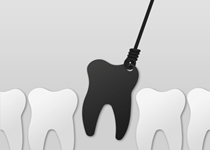 Traditional Chinese medicine believes that your teeth are very important for the health of the rest of your body. Chinese medicinal practitioners believe that every tooth is connected to every organ in the body.
Traditional Chinese medicine believes that your teeth are very important for the health of the rest of your body. Chinese medicinal practitioners believe that every tooth is connected to every organ in the body.
So could your teeth contribute to the root causes of disease? Well, according to some researchers, one common dental procedure may be at the root of the problem.
So picture this: You are in the dentist chair, and your dentist brings back an x-ray and says, “You need a root canal.” Your first reaction is to fix the problem; after all, you don’t want to lose your tooth. You would rather avoid replacing it with an artificial tooth, so you say yes to the root canal. However, it turns out that you could also be saying yes to increasing your risk of disease.
Bacteria are known to cause abscessed teeth, which leads to a root canal treatment. There are approximately 25 million root canals performed every year in the U.S. During root canal surgery, pulp within the tooth is removed, and it is filled with a foreign substance.
Dr. Weston Price was the first dentist to discover that chronic degenerative diseases can be the result of root canal surgery. In 1906, Dr. Price, six researchers, and Mayo Clinic microbiologists identified oral bacteria that leak from root canal surgery and lead to disease. An infection always remained from a root canal procedure, and it became toxic. The toxins became problematic when the immune system deteriorated.
Dr. Price would extract root-canalled teeth from diseased patients and implant the teeth under the skin of animals, including rabbits. In one instance, a rabbit developed arthritis from a woman’s tooth; the woman, however, recovered from her arthritis. The bacteria involved in the root canals were usually from the streptococcus family, as well as from fungi, spirochetes, and staphylococcus.
Dr. Price connected many other degenerative diseases with root canals, including the following:
- Kidney disease
- Lung diseases
- Bladder diseases
- Heart disease
- Stroke
- Diabetes
- Rheumatic and joint diseases
- Autoimmune diseases
- Neurological diseases, such as multiple sclerosis and Lou Gehrig’s disease (ALS)
Dr. Price even found that the development of degenerative diseases was also common immediately following root canal surgery. The American Dental Association continuously debunked the research from Dr. Price and the Mayo Clinic; however, they don’t have any research to prove them wrong.
There have also been correlations between cancer and root canals. During 40 years of treating terminal cancer, German physician Dr. Josef Issels found that 97% of his patients also had root canals.
As well, I found a manuscript that referred to preclinical studies that showed that ectopic bone morphogenetic protein-2 (BMP-2) expression could be used within root canal surgery. The overexpression of BMP-2 can induce calcification in MCF-7 xenograft breast tumors.
The Toxic Element Research Foundation (TERF) is a non-profit research foundation that has also continued the work of Dr. Price. They have used DNA analysis within the examination of root-canalled teeth, and bacterial contamination was found in every sample tested. In 43 root canal samples, TERF identified 42 anaerobic bacteria.
Dr. George Meinig also brought Dr. Price’s work to the forefront with his 1993 book Root Canal Cover Up.
But it’s not just root canals you should be wary of; mercury amalgams and nickel crowns are other dental procedures known to produce toxicity within the mouth and can compromise your health.
If root canals aren’t safe, then what is an appropriate dental alternative? You can decide to extract your tooth and receive a partial denture, bridge, or zirconium implant. Biological dentists are known to provide a toxin-free and holistic approach to performing dental procedures that do not put your health at risk; seeking the opinion of a biological dentist can also be a great choice for your overall health.
Sources for Today’s Article:
Liu, F., et al., “Humoral BMP-2 is Sufficient for Inducing Breast Cancer Microcalcification,” NIHPA Manuscripts July to August 2008; 7(4): 175–186.
“Root Canals Contain Toxic Bacterium,” Huggins Applied Healing web site; http://www.hugginsappliedhealing.com/root-canals-toxic.php, last accessed October 28, 2014.
Huggins, H., “Root Canal Dangers,” The Weston A. Price Foundation web site, June 25, 2010; http://www.westonaprice.org/holistic-healthcare/root-canal-dangers/.
“Porphyromonas gingivalis accelerates inflammatory atherosclerosis in a mouse model,” ScienceDaily web site, January 4, 2011; http://www.sciencedaily.com/releases/2011/01/110104101344.htm.
“97% of Terminal Cancer Patients Previously Had Root Canal Procedure,” Mercola.com web site, February 18, 2012; http://articles.mercola.com/sites/articles/archive/2012/02/18/dangers-of-root-canaled-teeth.aspx.
“Why You Should Avoid Root Canals Like the Plague,” Mercola.com web site, November 16, 2010; http://articles.mercola.com/sites/articles/archive/2010/11/16/why-you-should-avoid-root-canals-like-the-plague.aspx.
Meinig, G. E., “Dr. Weston A. Price and The Root Canal Cover-Up,” Educate-Yourself.org web site, April 2, 2004; http://educate-yourself.org/cn/rootcanalcoverup02apr04.shtml.
“Root Canal Treatment,” Canadian Dental Association web site; http://www.cda-adc.ca/en/oral_health/procedures/root_canal/, last accessed October 28, 2014.
